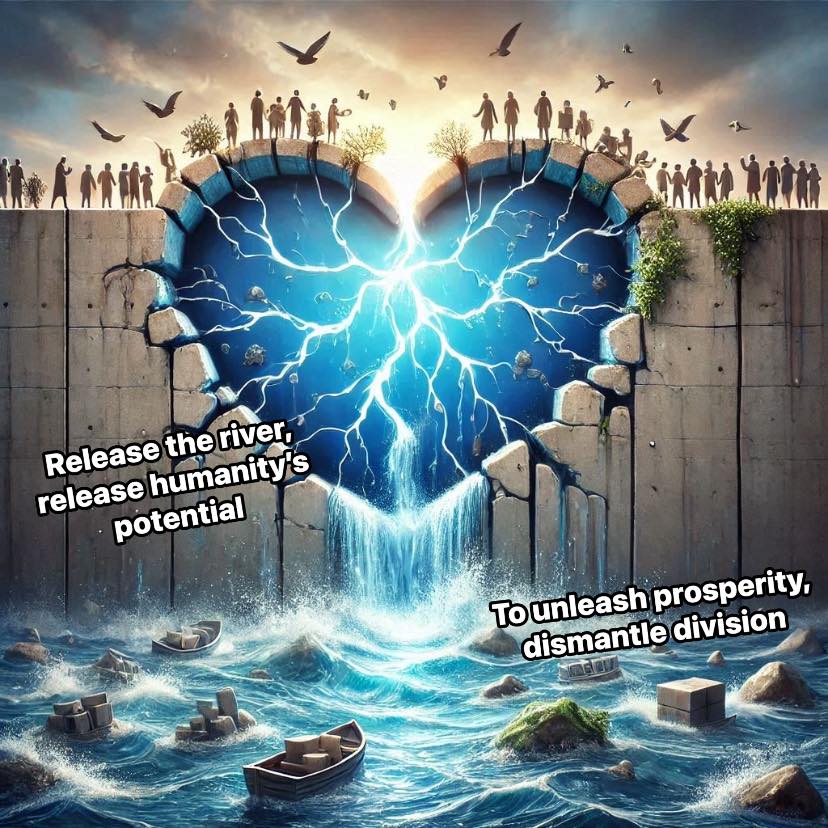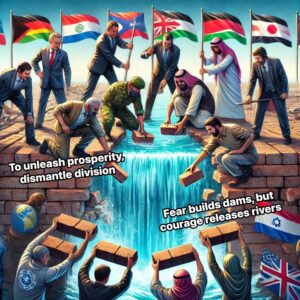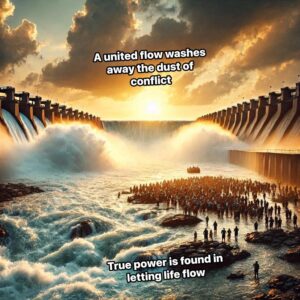
In a land shaped by mountains and valleys, a mighty river flowed, born from the icy peaks where the air was pure and the world untouched. The river surged forward with an eagerness known only to the young, carving paths through stone, nourishing the lands it touched, and whispering promises of life, growth, and abundance.
For centuries, the river flowed freely, unstoppable in its journey toward the boundless sea. Villages thrived on its banks, fields flourished under its care, and children played in its cool waters. The river was not just a body of water — it was life itself, a thread weaving the fabric of prosperity and unity.
But one day, driven by fear and mistrust, the rulers of neighboring lands built barriers across the river. They wanted to control its flow, believing that in possession lay power. Massive dams rose, one after the other. Each ruler claimed a piece of the river, building walls higher and stronger. The once mighty river, so full of promise, was confined to pools and reservoirs, its strength subdued.
The effects were swift and cruel. The villages downstream, once green and fertile, turned to dust. The crops withered. The children who once splashed in the riverbed now walked across cracked, parched earth. The people grew bitter and afraid, blaming each other for the drying river. Conflict ignited. Suspicion became a shadow that darkened every interaction.
The river, now held back, grew restless and angry behind the walls. Its waters swirled in trapped eddies, pressing against the barriers that imprisoned it. Tension mounted. The river’s natural rhythm, meant to flow forward, now threatened to destroy everything.
In one of the villages lived a young woman named Amara, who remembered the days when the river ran free. She remembered the laughter of children, the songs of farmers returning with abundant harvests, and the cool breeze carrying the scent of water-fed blossoms. Every night, she dreamed of the river’s old path, of freedom and abundance lost to fear and greed.
One day, unable to bear the sight of her dying land, Amara gathered the elders and the youth, the farmers and the artisans. She spoke with quiet passion. “The river is like our lives — it wants to surge forward, to nourish and sustain us. But we have built these barriers of distrust, war, and greed, and now we suffer. We must release the river.”
The people hesitated. “But the walls are strong,” one elder said. “The rulers will never agree.”
“Then we must show them,” Amara replied, “that holding the river back is destroying us all. We must break the barriers — not with force, but with unity.”
Amara’s words spread through the villages like seeds in the wind. Farmers, artisans, and children began to travel to each neighboring land, carrying with them dried branches and cracked soil, silent witnesses to the devastation. They spoke not of blame but of the shared suffering caused by the barriers. Slowly, the message took root. The rulers, seeing the anguish reflected in their own people’s eyes, began to understand. The barriers they had built were not protecting them — they were imprisoning them.
One by one, the rulers agreed to dismantle the dams. It was not an easy task. The walls had stood for years, reinforced by suspicion and pride. But with each stone removed, the river’s imprisoned waters quivered with anticipation.
At last, on a golden morning, the final barrier crumbled. A deep silence fell over the gathered crowd as the river, free at last, roared forward in a surge of joy and power. It rushed through the valleys, reclaiming its path, flooding the fields with life, carrying not only water but also a powerful message: Peace is the key to unleashing the true potential of humanity, just as a free-flowing river nourishes everything in its path.
The people wept and laughed, feeling the cool touch of the water on their skin, a blessing long denied. The river, no longer a source of division, had become a bond of unity. Villages once separated by suspicion now shared the river’s gifts. The children played together again, their laughter a song of hope carried on the breeze.
Amara stood by the riverbank, watching the water shimmer in the light. She knew the river’s freedom was not just about water — it was about people daring to trust, to break down the barriers within their hearts.
For human life, like the river, longs to flow forward, unimpeded by fear and conflict. And in the end, peace is not merely the absence of barriers, but the courageous act of removing them — of letting life surge forward, ever toward its fullest potential.



